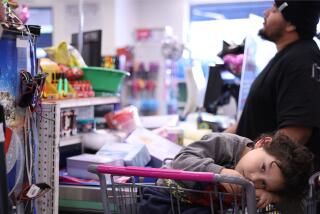PERSPECTIVE ON CONSUMERS : If You Build It, They Will Come : The lines at the new Lucky store in the Crenshaw district affirm black support for community businesses.
A stranger could be forgiven if, when he drove past the newly opened Lucky grocery store in the Crenshaw district last week, he thought people were lined up for something bigger than groceries.
Groceries ordinarily do not make you stand for up to an hour to buy them nor wait to be admitted through the doors in small groups. (It was if you were going to view treasures of ancient Egypt instead of flank steak.) The introduction of groceries into a neighborhood does not usually entail the services of several traffic guards and the local police.
That’s what happened, though, on April 2 when the new store opened. The event was noted in the media: The “Today” show’s Katie Couric looked on in disbelief at the checkout lines (which often stretched the length of the store), and a local radio station blithely informed its listeners that the new store was the first of its kind “in Watts since the riots,” displaying a sort of Descartesian logic. (It’s black, therefore it’s Watts.) Amazing that something as mundane as the opening of a grocery store should have caused so much commotion, but it did. That’s because the area, which includes Baldwin Hills, View Park and Leimert Park, has not had a first-class, full-service grocery store in years. Although there are at least three supermarkets in the same two-mile radius, they are all part of the same chain and, some people felt, not up to par. Until this month, many residents routinely drove 20 minutes away for fresher produce and meat; people without access to cars fared less well. It’s a fate that we residents of black neighborhoods are all too familiar with.
We shouldn’t be. Black purchasing power has increased steadily in the past 20 years, and we account for a significant chunk of many essential businesses. If, for instance, we stopped buying groceries, gasoline, cosmetics and baby products for a month, you’d notice.
Despite that, corporations are just beginning to realize the potential of the minority dollar. Major cosmetics companies, which for years offered few, if any, colors keyed to black (and Latina and Asian) skins have suddenly gotten religion. From “couture” cosmetics to drugstore lines, our true colors are suddenly showing up in bottles. And business has only gotten better.
Other industries could take their cue from the cosmetics companies. That jampacked grocery store shows that African-Americans are willing to spend significant proportions of our incomes if products are geared toward our particular needs and likes. We’d spend even more quickly if those products and services were offered offered in our communities. Just like white folks, we appreciate convenience.
Too often, minorities enjoy convenience only if we choose to integrate white communities. In terms of services, our neighborhoods have remained largely unequal. There is one movie theater to service the Crenshaw-Baldwin Hills area, and, although the Baldwin Theatre offers first-run movies in pleasant surroundings, it would do even better business if it could offer six theaters instead of three.
Same thing with the Baldwin Hills-Crenshaw Plaza. Touted as the largest urban mall in the country, the shopping area, with its elegant palm oases and marble floors, is still only partially occupied. It needs a plan that allows small merchants affordable square footage while encouraging the addition of another national department store anchor. Together, they would increase foot traffic and offer wider consumer choice--not only to local residents, but to shoppers from other areas as well.
For decades, common marketing wisdom has dictated that products and services geared toward black consumers should be less varied and less expensive. Perhaps there was some economic justification for that 50 years ago, but the growth of the black middle class since the mid-1960s, coupled with the willingness of African-Americans at all economic levels to make intelligent consumer decisions, should be an alarm clock to large corporations contemplating how to grab their piece of the pie in black communities. One hopes that the opening of Lucky’s Crenshaw store will have been the catalyst for that awakening. In contemplating expansion into Los Angeles’ minority neighborhoods, corporate heads should consider the wisdom of the ghost in “Field of Dreams”: “If you build it, they will come.”
More to Read
Inside the business of entertainment
The Wide Shot brings you news, analysis and insights on everything from streaming wars to production — and what it all means for the future.
You may occasionally receive promotional content from the Los Angeles Times.










